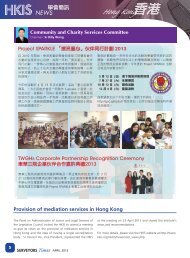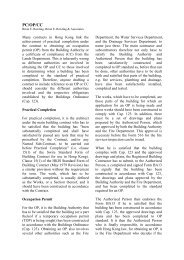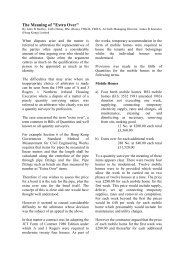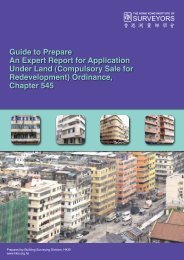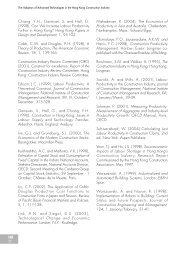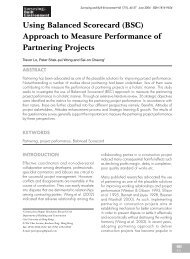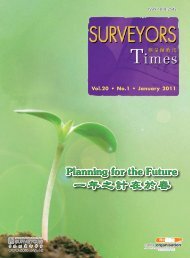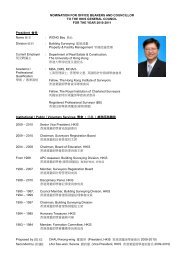Surveying & Built Environment Vol. 22 Issue 1 (December 2012)
Surveying & Built Environment Vol. 22 Issue 1 (December 2012)
Surveying & Built Environment Vol. 22 Issue 1 (December 2012)
Create successful ePaper yourself
Turn your PDF publications into a flip-book with our unique Google optimized e-Paper software.
about comparable properties and<br />
supplement it with information from<br />
conveyancing documents, if it is readily<br />
available. Then, they either simply use<br />
the capital value of the comparable land<br />
without adjustments or they decapitalise<br />
the land value of the comparable<br />
property to its annual equivalent using<br />
an ‘appropriate rate of interest’. The<br />
resulting figure is recapitalised for the<br />
term of the subject land. The resulting<br />
figure is deemed the land value.<br />
To obtain PV, the land value is added<br />
to NRC as described in Equation 2.<br />
Then, even though cost is used as<br />
proxy for value, they adopt the general<br />
assumptions underpinning market<br />
value, namely that:<br />
a) There is a willing seller;<br />
b) Prior to the date of valuation,<br />
there had been a reasonable<br />
period for the proper marketing<br />
of the interest, for the agreement<br />
of price and terms, and for<br />
completion of the sale;<br />
c) That the state of the market,<br />
level of values and other factors,<br />
as on an earlier assumed date of<br />
exchange of contracts, were the<br />
same as on the date of valuation;<br />
d) That the property will be freely<br />
exposed to the open market and<br />
that no account will be taken of<br />
any price that might be paid by a<br />
purchaser with a special interest;<br />
e) Both parties to the transaction<br />
had acted knowledgeably,<br />
prudently and without<br />
compulsion (For a discussion,<br />
see Johnson et al., 2000, pp.<br />
404-405 for discussion).<br />
These assumptions are strange, given<br />
that the valuers have to guess what<br />
happens in the real estate markets,<br />
<strong>Surveying</strong> and <strong>Built</strong> <strong>Environment</strong> <strong>Vol</strong> <strong>22</strong>, 37-60 Nov <strong>2012</strong> ISSN 1816-9554<br />
leading to questionable judgments, such<br />
as the choice of capitalisation rates<br />
(Ezaah, 2007). Mends (2006, p.10)<br />
has even suggested that the opinion<br />
of valuers in Ghana is not reliable.<br />
Consequently, there is a general<br />
perception that valuers are ‘magicians’<br />
or ‘value inventors’ in Ghana (Ayittey<br />
et al., 2006).<br />
Nevertheless, given that valuation is<br />
an art; not a science, it may be argued<br />
that most aspects of the process of<br />
estimating value in Ghana are justified.<br />
The valuers have tried to adapt the<br />
normative theory underpinning the Cost<br />
Method of valuation to the extremely<br />
difficult circumstances in which they<br />
find themselves. These tensions and<br />
contradictions do not mean that there is<br />
no information at all in the real estate<br />
market in Ghana such that only the<br />
Cost Method of valuation can be used.<br />
Indeed, as suggested in Table 1, there<br />
are some cases where there is sufficient<br />
market information to allow valuers<br />
to use other methods of valuation,<br />
such as the Market and the Investment<br />
Approaches. Rather, the pervasive<br />
problem of asymmetric information<br />
implies that, unlike in developed<br />
economies with relatively developed<br />
real estate markets, the Cost Approach<br />
is the norm in Ghana, while other<br />
approaches constitute exceptions.<br />
Given that little or no litigation<br />
is reported in the popular press,<br />
professional meetings, academic<br />
lectures or conferences about legal or<br />
professional challenges to the use of<br />
the method, it may be inferred that the<br />
valuers have been successful. Also,<br />
it seems that, generally, clients are<br />
satisfied with the work of most valuers<br />
in Ghana (Obeng-Odoom and Ameyaw,<br />
2010; Obeng-Odoom and Ameyaw,<br />
SBE<br />
51



